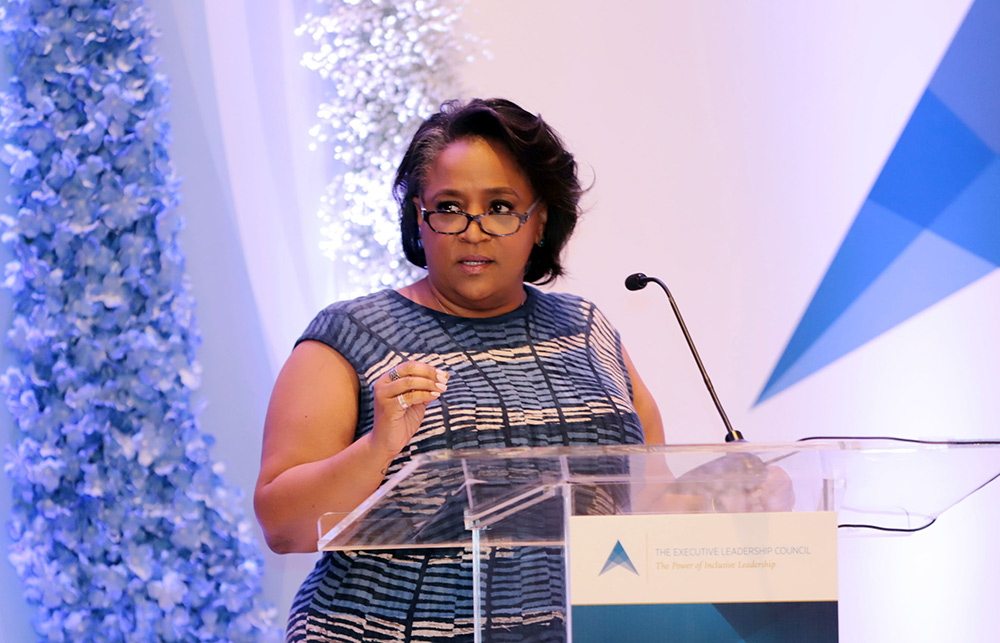黑人不乏人才,是什么阻碍了他们晋升高管?

过去几周发生的惨痛悲剧引发了全国的关注。目前,美国正处在十字路口:或者勇敢追求更公平的未来,或者满足于我们熟悉但却令人失望的现状。
美国企业界也正处于拐点。企业自身正面临着种族歧视和公平问题,包括招聘、晋升和留住更多黑人领导方面过程缓慢。
尽管观点不断变化,数据不断涌现,但一些企业领导人仍认为,根本没有多少黑人人才有资格升任企业决策层和董事会成员。全国无数才华横溢的黑人高管和研究这一课题的研究人员都不同意这一观点。晋升资格并不是核心问题;我们缺少的是晋升的机会。
黑人很少能成为企业高管,他们也不会像其他同事一样受到高度重视,因此也不会取得成功,但令人遗憾的是,事实就是这样。去年秋天,全球领先的组织咨询公司光辉国际(Korn Ferry)公布了对《财富》500强企业中一些最资深的损益业务黑人高管的采访结果。许多人表示,“要想与其他同事处于同一水平线上,必须加倍努力。”
这就是整个美国企业界目前存在的不平等现象。
现在是时候开辟一条新的道路了。我个人亲身经历过,有目的的行动和持续的职业发展可以改变一个人的人生。包括我在内的无数黑人高管在职业生涯中的某个时间点完成了执行领导委员会(ELC)推行的领导能力发展计划。
ELC领导能力发展与研究所推出了几项年度计划。中层管理者研讨会(MLMS)面向近1,000名极具潜力的企业管理者传授专业发展经验,为期两天。今年是MLMS举办的第26个年头,参与者可倾听备受推崇的业界黑人专家发表的意见,并与ELC成员直接沟通,以培养洞察力并增强执行能力。领导力发展周期间,为经验丰富的管理者提供了五项计划。我们为准备进入或即将进入企业决策层的黑人高管举办了企业决策层学会。愿意培养黑人人才的公司将派精英员工参加这些会议。
放眼未来,我们还大力培养崭露头角的黑人人才。我们为就读于传统黑人大学(HBCUs)的学生提供本科奖学金。我们的荣誉研讨会将这些奖学金获得者推荐给合适的ELC领导人,双方可深入讨论如何在美国企业界脱颖而出,成为黑人高管。我们为黑人MBA学生举办商业案例竞赛,让他们就企业界目前面临的商业挑战案例提交解决方案,从而赢得奖学金和实习机会。最近,我们推出了一项黑人男性倡议,从三所试点学校开始,提高黑人男性从HBCU商学院成功毕业的机率。
ELC深入培训课程和倡议与众不同:其设计独特,旨在通过课程培养进入董事会的黑人领导梯队。这些课程还为黑人高管和管理者提供领导能力培养和指导,而这在美国企业界是不可能得到的。
我们很自豪能够自己帮助自己,但我们需要有意合作的伙伴为美国企业界的黑人人才创造更多的机会。这不仅仅是正确的行动;研究还表明,人员、思想和经验多样性有助于企业获得优势。要想充分挖掘黑人高管和其他人才的才能和专业知识,将需要深思熟虑并持之以恒。
ELC提出了独特的倡议和网络,无数黑人管理者和高管从中受益,已有数百人升任企业决策层和董事会成员。
苏珊•查普曼•休斯就是领导力之路的一个突出案例,她是美国运通公司(American Express)执行副总裁/总经理兼全球数字能力、转型和运营主管,也是J.M.Smucker公司董事候选人。她起初只是ELC学者,后来参加了ELC推出的MLMS和“加强梯队”计划。她曾是ELC公司董事会倡议中的一员,该倡议旨在培养黑人高管进入公司董事会。
苏珊说:“ELC在我的成功职业生涯中对我的帮助很大。多年来,ELC的许多计划让我受益匪浅。从被选为论文获奖者到加入首届公司董事会倡议,多年来,我得到了许多非常宝贵的指导和机会。”苏珊案例是众多成功案例中的一个,展示了如何通过ELC计划增强领导能力并建立关系网,进而进入最高管理层。
我们并不是唯一一家培养黑人人才成为企业高管的公司。一些黑人高管曾参加过管理学研究生联合会、明日管理领袖,研修过哈佛大学、沃顿商学院、哥伦比亚大学、达顿商学院和凯洛格商学院等众多大学的MBA课程。我们与INROADS、Calibr、NACD和全美黑人MBA协会建立了合作关系,这只是我们值得信赖的其中一个原因。
黑人高管人数众多,他们已经证明自己具有领导才能。如果你不认识他们,现在是时候认识他们了。
因此,我想向美国企业界领导层传达的讯息很简单:要有意识。要大胆。要承担责任。要保持透明。我们能帮助您。我们可以共同构建包容性经济,为社会和股东创造价值。(财富中文网)
克里斯托 E•阿什比目前担任执行领导委员会临时主席兼首席执行官。
译者:Biz
过去几周发生的惨痛悲剧引发了全国的关注。目前,美国正处在十字路口:或者勇敢追求更公平的未来,或者满足于我们熟悉但却令人失望的现状。
美国企业界也正处于拐点。企业自身正面临着种族歧视和公平问题,包括招聘、晋升和留住更多黑人领导方面过程缓慢。
尽管观点不断变化,数据不断涌现,但一些企业领导人仍认为,根本没有多少黑人人才有资格升任企业决策层和董事会成员。全国无数才华横溢的黑人高管和研究这一课题的研究人员都不同意这一观点。晋升资格并不是核心问题;我们缺少的是晋升的机会。
黑人很少能成为企业高管,他们也不会像其他同事一样受到高度重视,因此也不会取得成功,但令人遗憾的是,事实就是这样。去年秋天,全球领先的组织咨询公司光辉国际(Korn Ferry)公布了对《财富》500强企业中一些最资深的损益业务黑人高管的采访结果。许多人表示,“要想与其他同事处于同一水平线上,必须加倍努力。”
这就是整个美国企业界目前存在的不平等现象。
现在是时候开辟一条新的道路了。我个人亲身经历过,有目的的行动和持续的职业发展可以改变一个人的人生。包括我在内的无数黑人高管在职业生涯中的某个时间点完成了执行领导委员会(ELC)推行的领导能力发展计划。
ELC领导能力发展与研究所推出了几项年度计划。中层管理者研讨会(MLMS)面向近1,000名极具潜力的企业管理者传授专业发展经验,为期两天。今年是MLMS举办的第26个年头,参与者可倾听备受推崇的业界黑人专家发表的意见,并与ELC成员直接沟通,以培养洞察力并增强执行能力。领导力发展周期间,为经验丰富的管理者提供了五项计划。我们为准备进入或即将进入企业决策层的黑人高管举办了企业决策层学会。愿意培养黑人人才的公司将派精英员工参加这些会议。
放眼未来,我们还大力培养崭露头角的黑人人才。我们为就读于传统黑人大学(HBCUs)的学生提供本科奖学金。我们的荣誉研讨会将这些奖学金获得者推荐给合适的ELC领导人,双方可深入讨论如何在美国企业界脱颖而出,成为黑人高管。我们为黑人MBA学生举办商业案例竞赛,让他们就企业界目前面临的商业挑战案例提交解决方案,从而赢得奖学金和实习机会。最近,我们推出了一项黑人男性倡议,从三所试点学校开始,提高黑人男性从HBCU商学院成功毕业的机率。
ELC深入培训课程和倡议与众不同:其设计独特,旨在通过课程培养进入董事会的黑人领导梯队。这些课程还为黑人高管和管理者提供领导能力培养和指导,而这在美国企业界是不可能得到的。
我们很自豪能够自己帮助自己,但我们需要有意合作的伙伴为美国企业界的黑人人才创造更多的机会。这不仅仅是正确的行动;研究还表明,人员、思想和经验多样性有助于企业获得优势。要想充分挖掘黑人高管和其他人才的才能和专业知识,将需要深思熟虑并持之以恒。
ELC提出了独特的倡议和网络,无数黑人管理者和高管从中受益,已有数百人升任企业决策层和董事会成员。
苏珊•查普曼•休斯就是领导力之路的一个突出案例,她是美国运通公司(American Express)执行副总裁/总经理兼全球数字能力、转型和运营主管,也是J.M.Smucker公司董事候选人。她起初只是ELC学者,后来参加了ELC推出的MLMS和“加强梯队”计划。她曾是ELC公司董事会倡议中的一员,该倡议旨在培养黑人高管进入公司董事会。
苏珊说:“ELC在我的成功职业生涯中对我的帮助很大。多年来,ELC的许多计划让我受益匪浅。从被选为论文获奖者到加入首届公司董事会倡议,多年来,我得到了许多非常宝贵的指导和机会。”苏珊案例是众多成功案例中的一个,展示了如何通过ELC计划增强领导能力并建立关系网,进而进入最高管理层。
我们并不是唯一一家培养黑人人才成为企业高管的公司。一些黑人高管曾参加过管理学研究生联合会、明日管理领袖,研修过哈佛大学、沃顿商学院、哥伦比亚大学、达顿商学院和凯洛格商学院等众多大学的MBA课程。我们与INROADS、Calibr、NACD和全美黑人MBA协会建立了合作关系,这只是我们值得信赖的其中一个原因。
黑人高管人数众多,他们已经证明自己具有领导才能。如果你不认识他们,现在是时候认识他们了。
因此,我想向美国企业界领导层传达的讯息很简单:要有意识。要大胆。要承担责任。要保持透明。我们能帮助您。我们可以共同构建包容性经济,为社会和股东创造价值。(财富中文网)
克里斯托 E•阿什比目前担任执行领导委员会临时主席兼首席执行官。
译者:Biz
The wrenching tragedies of the past several weeks have arrested the attention of our nation. Now, America is at a crossroads: We can boldly pursue a more equitable future, or we can remain content with the familiar and disappointing status quo.
Corporate America is at an inflection point as well. Companies are confronting issues with race and equity in their own ranks, including slow progress in hiring, promoting, and retaining more black leaders.
Despite changing sentiment and emerging data, some corporate leaders contend there is simply not enough black talent to ascend to the C-suite and corporate board service. The many thousands of talented black executives across the country and researchers who study the topic would disagree. Preparation is not the central issue here; what we lack are opportunities for advancement.
Here is the unfortunate truth: Too often, black corporate leaders are not seen, not valued as highly as their peers, and not positioned for success. Last fall, Korn Ferry, a leading global organizational consulting firm, released the result of its interviews with some of the most senior black profit and loss (P&L) leaders at Fortune 500 companies. Many reported “having to work twice as hard—and accomplish twice as much—to be seen on the same level as their colleagues.”
This is what systemic inequality looks like in corporate America.
It is time to chart a new and better course. I know firsthand that intentional action and ongoing professional development can change a person’s life. Thousands of black executives, including myself, have completed the Executive Leadership Council (ELC) leadership development programs at some point during our careers.
The ELC’s Institute for Leadership Development and Research offers several annual programs. The Mid-Level Managers’ Symposium (MLMS) is a two-day professional development experience for nearly 1,000 high-potential corporate managers. In its 26th year, MLMS allows participants to hear from highly regarded black industry experts and interface directly with ELC members to develop insights and build executive competencies. Five programs for more seasoned managers are offered during Leadership Development Week. We host a C-Suite Academy for black executives who are ready to enter or are beginning their tenure in the C-suite. Corporations looking to invest in their black talent will send their high-performing employees to these conferences.
With an eye on the future, we also invest in up-and-coming black talent. We offer undergraduate scholarships for students matriculating at historically black colleges and universities (HBCUs). Our Honors Symposium pairs these recipients with ELC leaders for in-depth discussions on how to excel as black executives in corporate America. We host a business case competition for black MBA students to submit solutions to case studies on current business challenges facing the corporate world, earning them scholarships and internships. Most recently, we established a black male initiative to increase the successful graduation rate for young men enrolled in HBCU business schools, beginning with three pilot schools.
The ELC’s in-depth curriculum and initiatives are a class apart: They are uniquely designed to develop the black leadership pipeline from the classroom to the boardroom. And they provide black executives and managers leadership development and mentoring they are not likely to receive in corporate America.
We are proud to help our own, but we need willing partners to create more opportunities for black talent in corporate America. It is not just the right thing to do; research has shown that diversity of people, ideas, and experiences helps give businesses an edge. Tapping into the talent and expertise of black executives and others will take a deliberate and sustained commitment.
Of the thousands of black managers and executives who have benefited from the unique initiatives and networking offered by the ELC, hundreds have risen to C-suite positions and boardrooms.
An exceptional example of the path to leadership is Susan Chapman-Hughes, executive vice president/general manager and global head of digital capabilities, transformation, and operations at American Express and nominee for the board of directors of J.M. Smucker. She started as an ELC Scholar in college and went on to participate in the ELC’s MLMS and Strengthening the Pipeline program. She was a Cohort Member in the ELC’s Corporate Board Initiative, designed to prepare and position black executives for corporate board service.
“The ELC has been an integral part of my career success. I have benefited from many of ELC’s programs over the years,” said Chapman-Hughes. “From being selected as an essay winner to being a part of the inaugural Corporate Board Initiative, the coaching, mentoring, and access I have received over the years has been invaluable.” Susan’s is one of the many success stories of how the development and networking available through the ELC’s programs can lead to executive leadership opportunities at the highest levels.
And we are not the only ones developing black talent for corporate leadership. There are black executives who are alumni of the Consortium for Graduate Study in Management, Management Leadership for Tomorrow, and MBA programs at Harvard, Wharton, Columbia, Darden, and Kellogg among many others. Our partnerships with INROADS, Calibr, NACD, and the National Black MBA Association are only a sample of other reputable sources.
Black executives are plentiful and have proved themselves ready to lead. If you don’t know them, you should.
Thus, my message to the leadership of corporate America is simple: Be intentional. Be bold. Be accountable. Be transparent. And let us help you. Together, we can build an inclusive economy that delivers value for society and your shareholders.
Crystal E. Ashby is interim president and CEO of the Executive Leadership Council.













